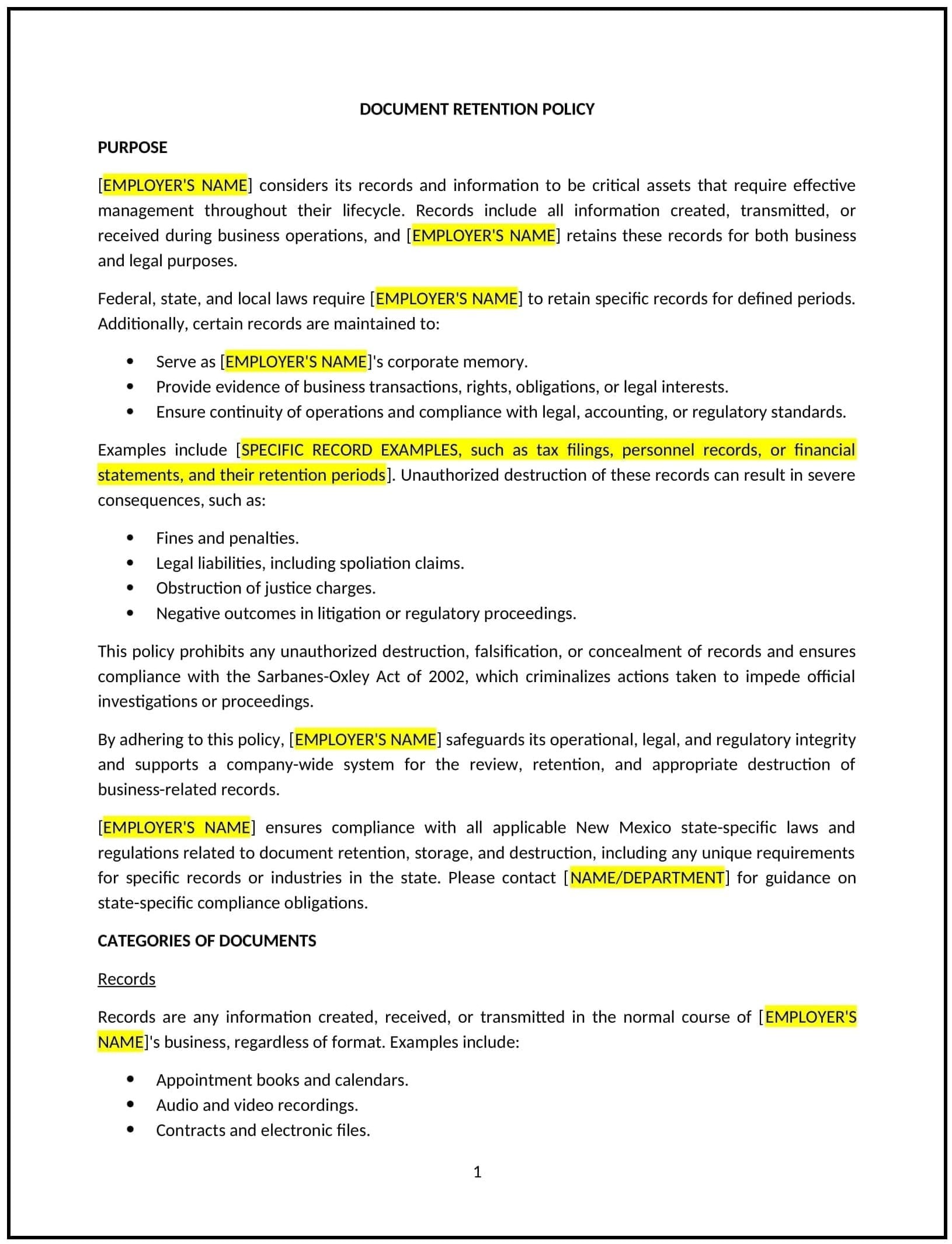Document retention policy (New Mexico): Free template
Got contracts to review? While you're here for policies, let Cobrief make contract review effortless—start your free review now.

Customize this template for free
Document retention policy (New Mexico)
This document retention policy is designed to help New Mexico businesses manage their records and documents effectively by outlining how long different types of documents should be retained and how they should be disposed of when they are no longer needed. The policy ensures that businesses retain essential records for the appropriate amount of time, while also protecting sensitive information and minimizing unnecessary storage costs.
By adopting this policy, New Mexico businesses can ensure proper management of their documentation, reduce the risk of retaining outdated or irrelevant records, and comply with state and federal regulations regarding document retention.
How to use this document retention policy (New Mexico)
- Define document types: Clearly categorize the types of documents that the business holds, such as financial records, employee files, contracts, client communications, and legal documents. Each category should have specific retention guidelines based on business needs and legal requirements.
- Set retention periods: Establish how long each type of document should be retained, ensuring that it aligns with any New Mexico state laws or federal regulations that may dictate minimum retention periods for certain records.
- Specify disposal methods: Outline how documents should be disposed of once they reach the end of their retention period. Businesses should use secure methods, such as shredding or secure digital deletion, to ensure sensitive information is properly destroyed.
- Address digital and physical documents: Provide guidelines for both physical and digital document retention. This should include instructions for managing electronic records, ensuring that they are stored securely, and properly archived or deleted when no longer needed.
- Reflect New Mexico-specific considerations: Include any New Mexico-specific legal requirements regarding document retention, such as industry-specific rules, tax laws, or data privacy laws that could affect how long certain documents must be kept.
Benefits of using this document retention policy (New Mexico)
Implementing this policy provides New Mexico businesses with several advantages:
- Promotes efficient record-keeping: Clear retention guidelines help businesses organize and maintain important documents, making it easier to retrieve records when needed and reducing clutter.
- Reduces legal risks: Proper document retention reduces the risk of legal challenges related to outdated or improperly discarded records, ensuring that essential information is available when required for audits, disputes, or investigations.
- Protects sensitive data: By following secure disposal practices, businesses can prevent unauthorized access to confidential or sensitive information, protecting both employees and clients.
- Minimizes storage costs: By regularly reviewing and purging outdated records, businesses can reduce the physical and digital storage space required to maintain documents, cutting costs associated with document management.
- Supports regulatory compliance: Adopting a document retention policy helps businesses align with New Mexico state laws and federal regulations, ensuring that they retain records for the appropriate amount of time and handle them securely.
Tips for using this document retention policy (New Mexico)
- Communicate the policy clearly: Ensure that all employees are aware of the document retention policy, especially those involved in managing records. Provide training to help them understand the retention guidelines and the importance of secure document handling.
- Regularly review and update the policy: The document retention policy should be reviewed periodically to ensure it stays aligned with any changes in New Mexico laws, federal regulations, or the business’s needs.
- Implement secure storage practices: Ensure that both physical and digital documents are stored securely. This can include locked filing cabinets for physical records and encrypted systems for electronic documents.
- Establish clear roles and responsibilities: Assign responsibility for document retention and disposal to specific individuals or teams within the business to ensure accountability and consistency.
- Track document retention schedules: Keep a record of when each document type is created and when it is scheduled for destruction. This will help ensure that documents are not retained longer than necessary and are properly disposed of at the appropriate time.